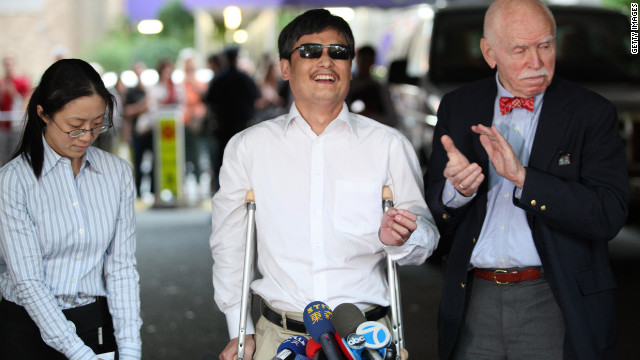
- Chinese activist Chen Guangcheng to address question 'what's next?' at event Thursday in New York
- He's currently studying in New York after leaving China following years of imprisonment
- Chen has said he is in the U.S. to recuperate and that he intends to return one day to China
- The 40-year-old self-taught lawyer sought U.S. help after fleeing from house arrest in April
Hong Kong (CNN) -- Chen Guangcheng chose his words carefully two weeks ago when he thanked China for its "restraint and calm" in allowing him to leave the country to "recuperate" in the U.S. after years of persecution.
Now the Chinese activist is due to speak at what's being billed as an "on-the-record event" at the Council of Foreign Relations in New York Thursday, alongside his long-time friend and adviser Jerome Cohen, a professor from New York University (NYU).
The 40-year-old self-taught lawyer will be answering the question raised soon after his dramatic escape from home detention in China in April; "What's Next for Chen Guangcheng?"
Part of the answer was revealed weeks ago when NYU extended an invitation to Chen to study at its School of Law. The offer was the activist's ticket out of China where he later told CNN he endured suffering "beyond imagination."
Chen's dramatic story of escape from house arrest, which he prefers to call "illegal detention," captured headlines worldwide. In the dead of night, the blind man scaled a wall before fleeing to Beijing and then the U.S. embassy which he later left, straining already tense negotiations between the U.S. and China over his fate.
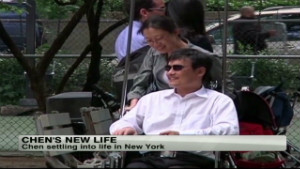 Chinese dissident Chen's new life
Chinese dissident Chen's new life 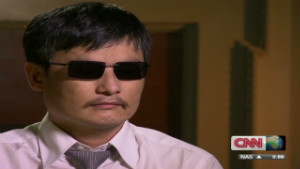 Chen's flight from China
Chen's flight from China Chen has indicated he has every intention to return to his homeland to continue his campaign for "justice and fairness." In an opinion piece for the New York Times Wednesday, under the headline "How China Flouts Its Laws," Chen wrote, "I have come here to study temporarily, not to seek political asylum."
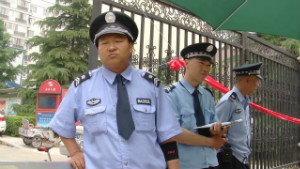 Chen leaves behind Chinese crackdown
Chen leaves behind Chinese crackdown He used the piece, published online in English and Chinese, to press the authorities to investigate the "lawless punishment" inflicted on him and his family over the past seven years.
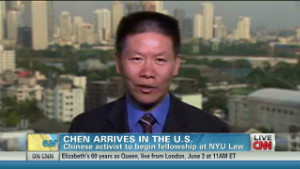 Chen Guangchang is in the U.S.
Chen Guangchang is in the U.S. Chen has hesitated to reveal details about what happened during his four years of imprisonment from 2006 for "damaging property and organizing a mob to disturb traffic."
And in an interview with CNN five days after arriving the U.S., he was reluctant to describe the periodic beatings he says he and his wife endured during 18 months of detention in their village of Dongshigu in Shandong Province.
"I don't want to talk about it right now," he told CNN's Anderson Cooper. "I need some time to gather my thoughts."
Chen has been more forthcoming about the alleged abuse of his extended family after the local police discovered he had escaped.
"A furious pack of thugs -- not one in uniform, bearing no search or arrest warrants and refusing to identify themselves -- scaled the wall of my brother Guangfu's farmhouse in the dead of night, smashed through the doors and brutally assaulted my brother," he wrote in the New York Times.
"After detaining him, the gang returned twice more, severely beating my sister-in-law and nephew with pickax handles. At that point, Kegui tried to fend them off by seizing a kitchen knife and stabbing, but not killing, three of the attackers," he said.
Chen Kegui was later charged with attempted murder. On Saturday, his father Chen Guangfu -- Chen Guangcheng's brother -- told CNN that the family hadn't been allowed to see the younger Chen in custody, and that heavy security had been maintained around their village.
Writing in the New York Times, Chen said that the lawlessness evident in the treatment of his family "may be the greatest challenge" facing the next generation of Chinese leaders.
"Indeed," he wrote, "China's political stability may depend on its ability to develop the rule of law in a system where it barely exists."
Comments
Post a Comment